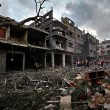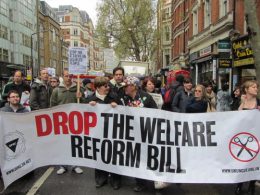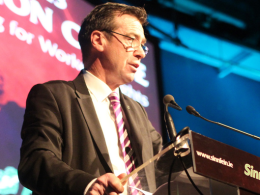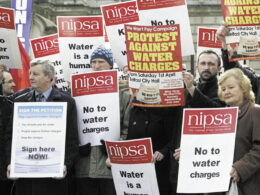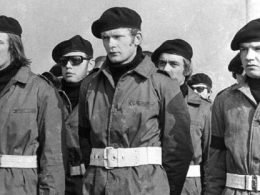THE CONSULTATIVE Group on the Past, or Eames-Bradley group, has published its report on the Troubles. Lord Eames, one of the report’s authors, says it is time for a “final step out of the conflict by dealing with the legacy of the past.” The problem is that this report does anything but deal with the actual legacy of the past.
The report makes a large number of proposals, which may or may not be accepted by the British government. These include a Legacy Commission, headed by an International Commissioner with responsibility for “society issues” and two commissioners who will have responsibility for “Review and Investigation” and “Information Recovery and Thematic Cases.” These commissioners will be appointed by the British and Irish governments (with the approval of the First and Deputy First Minister). Who the commissioners will be finally accountable to is not clear.
The Commission will take over the work currently carried out by the police ombudsman, which investigates complaints against the police, and the Historical Enquiries Team, a specialist police unit set up to investigate unsolved killings throughout the Troubles.
A Reconciliation Forum will be established and the nearest relative of each person who died in the Troubles will receive a £12,000 “recognition payment”. There will be no new public inquiries. The Group does not propose an amnesty for those involved in violence, but recommended the Legacy Commission should make proposals on how “a line might be drawn”. Finally there will be an annual Day of Reflection and Reconciliation and a shared memorial to the conflict.
The report is fundamentally flawed. It is based on the assumption that everyone in Northern Ireland somehow shares the “blame” for the events of the past forty years. According to the report, “a reconciling society takes collective responsibility for the past instead of attributing blame and avoiding responsibility.”
The idea of collective responsibility is entirely erroneous. Sectarian and right wing forces on both sides of the sectarian divide, and the British and Irish ruling classes were responsible for the conflict, and are entirely capable of dragging us back to conflict again in the future. Tens of thousands of trade union and other working class community activists stood against the slide into violence in the late sixties and early seventies, in many cases forming joint Catholic/Protestant anti-sectarian patrols to prevent intimidation. Rank and file trade unionists – not always with the aid of trade union officials – worked hard to keep sectarianism out of the workplaces and prevented even more serious outbreaks of violence at key times throughout the Troubles through mass mobilisations, strikes and demonstrations.
The concept of collective responsibility means that no-one actually takes any responsibility for their words or actions and that the guilty individuals and forces receive no blame. The problem with this is that the same forces, and some of the same individuals, remain in place. They are part of the problem not part of the solution.
The leader of the Ulster Unionist Party Reg Empey can condemn the report because it suggests paying £12,000 to the families of paramilitaries who died and conveniently forget the role he, David Trimble, and others in his party played in the formation of the paramilitary organisation Vanguard in the 1970s.
The DUP can condemn the Eames/Bradley report, desperate to avoid being outflanked by Jim Allister and Traditional Unionist Voice, safe in the knowledge the report will allow them to airbrush the DUP’s role in flagging the flames of sectarianism and violence for decades.
Sinn Fein has welcomed the Eames-Bradley report in part, but calls for the establishment of an “Independent International Truth Commission”. Sinn Fein however has no wish to shed light on the role of right wing politicians in the South in the formation of the Provisional IRA, a deliberate action intended to cut across the development of mass left wing organizations in Catholic areas. Nor does Sinn Fein wish to see the spotlight turned on the many sectarian killings carried out by the IRA over the course of the Troubles.
Of course the British ruling class has no intention of allowing the truth of its murderous deeds to emerge. In the last analysis, the state will act in the interests of the ruling class. A process established by the state and answerable to the state will never reveal the truth about the crimes of the state.
In the future, the ruling class will use the same methods not just against Republicans but against trade unionists and socialists in the explosive social movements that lie ahead, in Northern Ireland, England, Scotland and Wales. The Southern state will do likewise.
If we do not learn from history, it will come back to haunt us.The underlying tensions that led to the conflict have not gone away and a return to conflict is inevitable at a certain stage if we do not overcome sectarianism in all its manifestations. It is vitally important that the role of the state in Northern Ireland is exposed as a warning to the working class movement in Ireland, Britain and across Europe.

